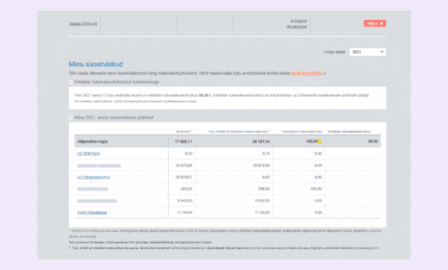Articles

Understanding Estonian taxable payments. Guide for businesses
Estonia’s unique corporate income tax system stands apart from traditional taxation models worldwide, offering businesses exceptional flexibility and growth opportunities. Unlike classical corporate tax systems that tax annual profits, Estonia operates on a distribution-based taxation model where corporate income tax is only triggered when profits leave the company or when non-business-related payments are made.
Read more
Expert Answers about dividends, accounting, and taxation in Estonia.
Earlier this week, Unicount hosted a live webinar for e-residents. The session was called E-Residency Can Power Your Business, and it brought together our business expert to answer real questions from real founders.
During Q&A, we covered everything from dividend payments and tax obligations to accounting workflows and intellectual property rights. The questions were sharp, the concerns valid, and the insights worth sharing. So in this blog, we’re highlighting the most important takeaways, especially for e-residents planning their businesses or navigating cross-border taxation.
Read more
How to scale your Estonian company as an e-Resident: From solo founder to small team
Starting a business as an e-resident in Estonia is refreshingly simple. You register your company online, manage it remotely, and enjoy the benefits of a transparent tax system and digital-first infrastructure. But what happens when your business starts to grow? When you move from being a solo founder to building a small team, the landscape changes, and so do your responsibilities.
Scaling is exciting, but it also requires structure. You’ll need to consider employment contracts, labor taxes, payroll reporting, and potentially adjustments to your company’s legal structure. At Unicount, we’ve seen this transition happen often. Many of our clients start lean and digital, then expand into something more substantial. This blog is for those founders, the ones ready to take the next step.
Read more
How to change board members or shareholders in your Estonian company: A practical guide
As your business grows, so does your team. Whether you’re bringing in new talent, restructuring ownership, or simply updating your company’s records, knowing how to properly change board members or shareholders is essential for staying compliant in Estonia.
At Unicount, we regularly assist e-residents with company amendments. These changes may seem procedural, but they carry legal weight, and when done correctly, they help protect your business, clarify responsibilities, and ensure smooth operations.
This guide walks you through the key steps, legal requirements, and practical considerations involved in updating your Estonian OÜ’s management board and shareholder structure.
Read more
Closing your Estonian company: What e-Residents need to know about liquidation
Liquidation isn’t something most entrepreneurs plan for when they launch a business. But for some e-residents, closing a company becomes a necessary step, whether due to shifting priorities, changing markets, or simply the natural end of a venture.
At Unicount, we’ve noticed a growing number of clients entering the liquidation process in Estonia. It’s a trend we take seriously, and we want to ensure that e-residents have access to clear, accurate information and professional support when making this decision.
This guide outlines the key steps, options, and considerations involved in liquidating a private limited company (OÜ) in Estonia. Whether you’re ready to dissolve your business or just exploring your options, we’re here to help.
Read more
Estonia’s e-Residency revenue doubled in 2025. What this means?
In the first half of 2025, Estonia’s e-Residency program generated €68 million in direct economic impact, nearly twice the projected figure. This surge in revenue, driven largely by tax contributions from e-resident companies, marks a turning point in the program’s evolution and signals a new era of opportunity for global founders.
For entrepreneurs seeking a streamlined, EU-based business environment, Estonia is no longer a hidden gem. It’s a proven platform for building lean, compliant, and scalable companies entirely online.
Read more
Why your Estonian company might lose EU VAT number?
For many e-residents, obtaining an EU VAT number is a key step in running a cross-border business through Estonia. It enables smoother invoicing, especially within the EU, and signals that your company is active and compliant.
In 2025, however, some e-resident companies have encountered challenges when applying for or maintaining their VAT registration. These cases are not due to sudden legal changes, but rather a more consistent application of existing rules by the Estonian Tax and Customs Board.
Read more
Dual tax residence explained: What e-Residents of Estonia must know
Estonia’s e-Residency program makes it possible to establish and run an EU-based company entirely online. But if you’re managing your Estonian company from another country, you may encounter a complex issue: dual tax residence.
Dual residence occurs when a company is considered a tax resident in more than one country at the same time. This can lead to confusion over where your company should pay taxes, how to report income, and which country has the right to tax your global earnings.
In this guide, we’ll explain what dual residence means, how it’s determined, and what steps you can take to avoid tax conflicts and stay compliant.
Read more
How to renew your e-Residency digital ID and keep your Estonian company active
Estonia’s e-Residency program allows entrepreneurs around the world to start and run an EU-based company entirely online. But like any official identity document, your e-Residency digital ID card has an expiration date. If you’re an e-resident managing an Estonian company, renewing your digital ID is essential to maintain access to Estonia’s secure digital services, including the Business Register, annual report filing, and digital signature tools.
In this guide, we’ll walk you through the renewal process, explain what to prepare, and highlight how to keep your Estonian company compliant during the transition.
Read more

